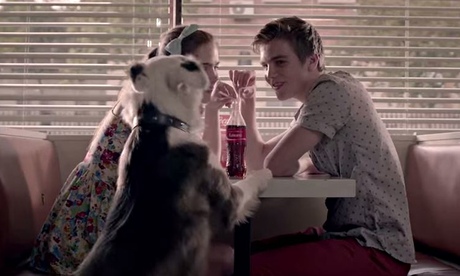
Coca-Cola is back with its Share a Coke campaign. Is revisiting a marketing campaign unimaginative or inspired? Photograph: The Coca-Cola Company
Coke has breathed new life into 2013's successful Share a Coke campaign, with a new TV ad featuring Bobby the dog hunting for his name, and a massively expanded selection of names and other identifiers – such as mum, bestie and gorgeous.
Few brands revamp previous ads. Yet Bobby Brittain, Coca-Cola UK's recently appointed marketing strategy and activation manager, points out that Coca-Cola has benefited from its oft-repeated Holidays are Coming ad since the 1930s.
"If it's not broken, don't fix it," he says, describing Coke's repeat sponsorships as "grist to the same mill".
Yet it's critical, of course, to keep up with consumer trends, and identify what it is about a campaign that works or doesn't.
And, according to Brittain, the strength of the Share a Coke campaign lies in making the brand social currency. But has this translated into sales?
Brittain claims that it's too soon to tell as activity is still ongoing. But data from retail market analysis firm IRI suggests not, revealing that Coke has been outpaced by the promotion-driven activity of Pepsi in the UK in August 2014. IRI data shows Coca-Cola sales fell 2.1% year-on-year to £667.47m in 2013-14, with Pepsi seeing its sales rocket 12.1% during the same period.
The UK, of course, represents just one market, and in 2014 Share a Coke was rolled out to North America for the first time. IRI's strategic insight director, Tim Eales, maintains the Share a Coke campaign has been a success despite his firm's findings. It just goes to show that great ideas don't always send sales fizzing, and nor does social currency.
However, if the goal for Coke was positive brand sentiment, data from marketing analytics firm Networked Insights is more encouraging. According to analyst David Porche, 45% of consumer sentiment has been favourable toward the campaign, according to its data from June to July 2014. The campaign also commanded an unusually large number of shares on social media, he says.
Drew Burdon, executive strategy director at agency R/GA, which has been working alongside Coca-Cola on some of the digital aspects of the campaign, points out the various ways it has been reworked this year – not least the expansion of names in the UK from 150 to over 1000, and the ability for consumers to create their own personalised drinks online if they can't find the names they're looking for in store.
"There was a Facebook app last year which created a virtual customised can and was really successful," says Burdon. "This year Coke has doubled its investment, and what it's trying to do is connect with consumers."
He also explains the relevance of the Bobby the dog ad – pointing out that Coke has made a virtue of this element of a hunt. "It's started a conversation, and even though people are no doubt complaining if they can't find what they are looking for – and which Coke is trying to resolve – this type of brand conversation is a good thing," he says.
Indeed, sales aside, what Coke has done is still clever, even groundbreaking. Will McInnes, chief marketing officer of social media listening and analytics company Brandwatch, says: "We are in an era of personalisation and vanity. This kind of 'Oh my God, it's me!' hook just works fantastically well whether you like it or not.
"Revisiting a campaign can be seen as redundant, stale and unimaginative. It's tricky to pull it off. But given the continued global obsession with photo sharing and social media self-promotion, Share a Coke is a naturally viral concept," he adds.
There's no doubt, too, that it takes a brave marketer to reinvent and strengthen an effective campaign, rather than returning to the drawing board. Matthew Hook, managing director of Carat, points out this approach can build on brand equity too – as Coke no doubt found with its Holidays are Coming ad, which has become synonymous with the festive period in many consumers' minds.
"What's remarkable is that this kind of reiteration of successful ideas is so rare," says Hook. "Most research into the business value ofadvertising will suggest that familiarity is an incredibly powerful tool, since it makes people feel comfortable with a brand and can often spark all kinds of positive associations."
"Most brands would benefit from consistency over time, but the pressures of the retail environment, the high levels of churn in the marketing industry and the pace of change in the media ecosystem tends to make many brands restless in pursuit of the new."
Whether Coke goes back to the drawing board ahead of 2015's key summer season remains to be seen. But if past form is anything to go by, it's a brand which knows how to play the long-term game.

No comments:
Post a Comment